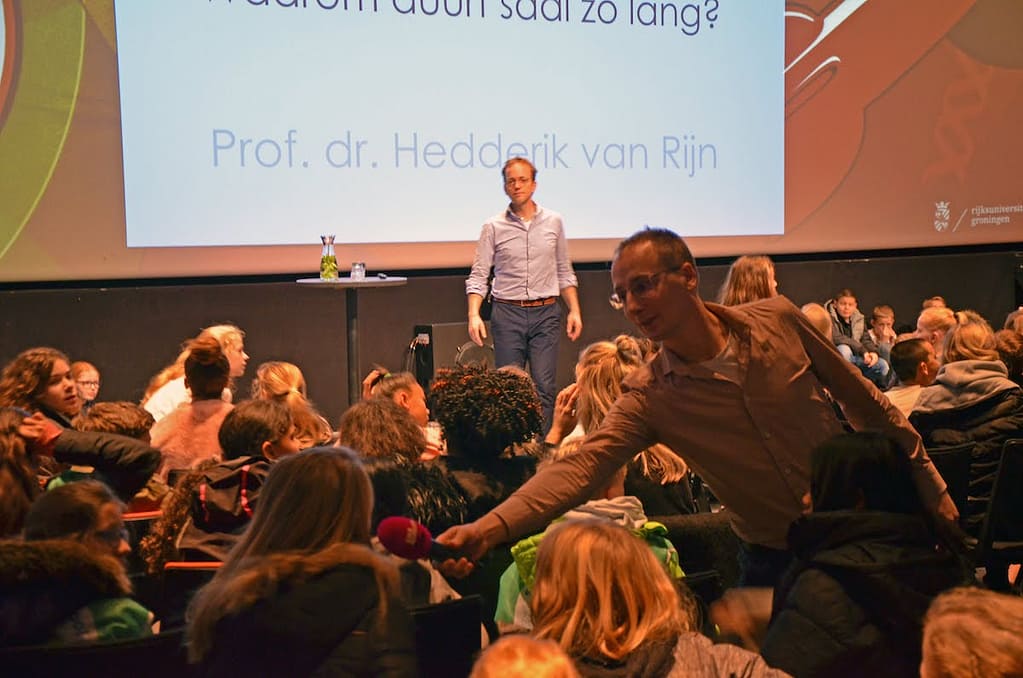
Talking About Time at the Kinderuniversiteit
“Why should I care? It is how it is!”
It’s an honest statement sometimes heard from children when they’re confronted with fundamental scientific questions that don’t apply to their lives directly. Finding ways to get kids to start thinking about scientific problems and be enthusiastic about it is a great challenge. This is especially true if the experiments that you do involve rather repetitive computer tasks.
Currently our lab (Hedderik van Rijn’s “Temporal Cognition Lab”) is involved in a project with the Kinderuniversiteit. This UG organization helps organize special lectures for children in the final years of primary school (10 to 12 years). As our lab in Experimental Psychology studies time perception, specifically in real-world settings (e.g., Schlichting et al, 2018; Van Rijn, 2018), our aim is to expose as many children as possible to the idea that time is not necessarily absolute but something that changes based on our perception. Kids can relate to this! Why does that boring math class feel like it’s taking hours, while when your parents tell you it’s time to stop playing Fortnite it feels like you’ve only just started!
But there are more interesting properties about time perception that might spark curiosity about cognitive psychology. For example, the perceived duration of an event is influenced strongly by previous experiences of that event (e.g., Jazayeri & Shadlen, 2010). Often, this influence is so subtle that you don’t even notice it, but it can be shown with a classic interval reproduction experiment (e.g., Maass & Van Rijn, in press).You present your participants with sounds of particular durations – for example, beeps of either 750 or 900 milliseconds (the experimental durations) – and ask them directly after to keep a button pressed for the same duration (the reproduction). After a couple of estimations, participants will have an expectancy of how long the durations are going to be and start to (on average) overestimate the short beeps and underestimate the long beeps. Something interesting happens when we replace the 750 ms beep with a 1080 ms beep. Now, that same 900 ms that was underestimated in the previous short context will be overestimated in the new long context. However, you need to repeat this quite often to find reliable mean differences. This is where it gets challenging when it comes to investigating this effect in children, as they can be impatient when it comes to repetitive tasks.

For the kids who are coming to the Kinderuniversiteit, we’ve designed a special experiment that we conduct with them in their schools before they go to the lecture. Instead of the boring beep, we let them control a virtual trumpet-playing frog so it seems more like a game. Granted, playing a virtual trumpet for about 8 minutes still feels like 20 minutes to most 8thgraders. However, they are quite able to keep focused on the task and seemed very curious for the results. This way, they can already get an idea of what a cognitive/experimental psychologist does: do experiments! During the three weeks before the mini-lecture we went to 9 primary schools to collect data and introduce our experiment to approximately 300 kids. In a filled Forum Images Hedderik presented the results of the experiment to quite a different crowd than he’s used to. It was a great experience to bring our science to young people this way!
References
van Rijn, H. (2018). Towards ecologically valid interval timing. Trends in cognitive sciences, 22(10), 850-852.
Jazayeri, M., & Shadlen, M. N. (2010). Temporal context calibrates interval timing. Natureneuroscience, 13(8), 1020.
Maass, S. C., & Van Rijn, H. (in press) 1-SecondProductions: A Validation of an Efficient Measure of Clock Variability. Frontiers in Human Neuroscience.
Schlichting, N., Damsma, A., Aksoy, E. E., Wächter, M.,Asfour, T., & van Rijn, H. (2018). Temporal Context Influences the Perceived Duration of Everyday Actions: Assessing the Ecological Validity of Lab-Based Timing Phenomena. Journal of Cognition, 1(1).



